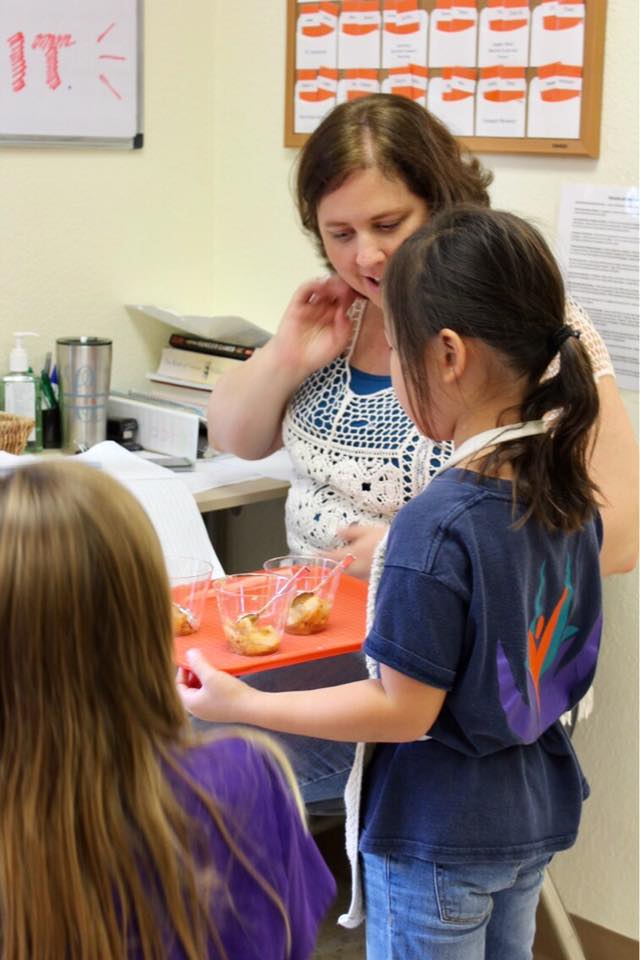“Because true beauty is based on simplicity, the classroom need not be an elaborate place, but everything within it must be of good design and quality, and as carefully and attractively displayed as a well planned exhibit” ~Maria Montessori
Another role of the directress is that of aiding the child within the environment. The directress should act as the link between the child and the environment. The directress should have accurate knowledge of all materials, their use and purpose, as well as an understanding of the sensitive periods of the children in order to match the lesson to the child’s specific needs. The directress should be ready to redirect and re-present whenever necessary with as few words as possible. “By using a few simple words, the teacher can more readily convey the truth that lies hidden in the materials. The lesson must be presented in such a way that the personality of the teacher shall disappear. There shall remain in evidence only the object to which she wishes to call attention of the child” (The Absorbent Mind, Montessori, p. 108). The directress should actively direct until the child has enough knowledge to proceed on his own. Once the link has been made, the directress becomes a passive observer. She should observe the child and his uses of the materials presented and intervene only when the child is in the state of disorder. Observing the children allows them to experience the repetition needed to internalize the work. “The greatest sign of success for a teacher…is to be able to say, ‘The children are now working as if I do not exist’” (The Absorbent Mind, Montessori, p. 283). In addition to the giving and observing of lessons in the classroom, the directress has the responsibility to respectfully protect and support the child in his growth toward social, emotional, physical, and intellectual advancement. She is to be the peace maker and advocate for the child as well as the keeper of records of all that involves the child and the planner for the needs of each child.
“The greatest sign of success for a teacher…is to be able to say, ‘The children are now working as if I do not exist’” ~Maria Montessori
The directress must prepare herself both physically and spiritually. In regards to the physical preparation of the directress, “…the teacher also must be attractive, pleasing in appearance, tidy and clean, calm and dignified…The teacher’s appearance is the first step to gaining the child’s confidence and respect. The teacher should study her movements, to make them as gentle and graceful as possible” (The Absorbent Mind, Montessori, p. 278). In regards to the spiritual preparation of the directress, “The real preparation of education is the study of one’s self. The training of the teacher who is to help life is something far more than the learning of ideas. It includes the training of the character; it is a preparation of the spirit” (The Absorbent Mind, Montessori, p. 132). In considering the spiritual preparation of one’s self, the directress should be sure to have a great deal of respect in the human spirit of the child. She should focus on the child, not herself, and in so doing, she will learn from the child. She should cultivate the ability to see and not judge, have compassion for the child, cleanse herself of pride and anger, be willing to grow and change, have a sense of humor about herself, recognize that her own habits are absorbed by the child, learn self-acceptance of imperfections and work on changing them with an honest desire to improve, have a love of life and enthusiasm for living, and be well adjusted and free from stress. As Dr. Montessori stated, “A good teacher does not have to be free from faults and weaknesses…We must be taught and we must be willing to accept guidance if we wish to become effective teachers” (The Secret of Childhood, Montessori, p. 149).
“A good teacher does not have to be free from faults and weaknesses…We must be taught and we must be willing to accept guidance if we wish to become effective teachers” ~Maria Montessori
Finally, the role of the directress involves being knowledgeable in the field of education and participation in the community. She should understand child development theories and how they integrate with the sensitive periods. She should know the curriculum and understand the purpose behind the design of the materials, be interested in what is happening in the world and continue to grow intellectually, and always retain a joy of learning. She should be willing to communicate with and educate parents about their child and the Montessori method, she should be active in helping parents become involved in the classroom and school, she should be able to work cooperatively with fellow educators, and she should participate in effecting social change within the community.


